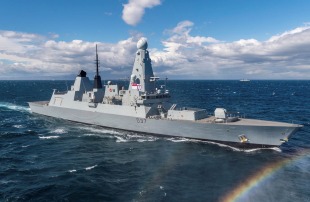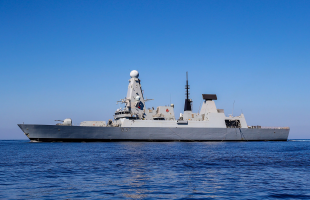Эскадренный миноносец УРО HMS Duncan (D37)
Основная информация
Главные размерения
Машина
- 2 * Rolls-Royce WR-21 gas turbines, 21.5 MW (28,800 shp) each
- 2 * Wärtsilä 12V200 diesel generators, 2 MW (2,700 shp) each
- 2 shafts integrated electric propulsion with
- 2 * Converteam electric motors, 20 MW (27,000 shp) each
Персонал
Боевые силы и средства
- SAMPSON multi-function air tracking radar (Type 1045)
- S1850M 3-D air surveillance radar (Type 1046)
- Raytheon Integrated Bridge and Navigation System
- 2 * Raytheon AHRS INS (MINS 2)
- 2 * Raytheon I-band Radar (Type 1047)
- 1 * Raytheon E/F-band Radar (Type 1048)
- Ultra Electronics Series 2500 Electro-Optical Gun Control System (EOGCS)
- Ultra Electronics SML Technologies radar tracking system
- Ultra Electronics/EDO MFS-7000 sonar
- UAT Mod 2.0 (2.1 planned)
- AN/SSQ-130 Ship Signal Exploitation Equipment (SSEE) Increment F cryptologic exploitation system
- Seagnat
- Naval Decoy IDS300
- Surface Ship Torpedo Defence
- Sea Viper air defence system with a 48-cell Sylver Vertical Launching System for a mix of Aster 15 short range and Aster 30 long range missiles
- Up to 2 * quad Harpoon anti-ship missile launchers
- 1 * BAE 4.5 inch Mk 8 naval gun
- 2 * Oerlikon 30 mm guns
- 2 * 20mm Phalanx CIWS
- 2 * Miniguns
- 6 * 7.62mm General Purpose Machine Guns
- 1–2 * Lynx Wildcat, armed with:
- 4 * anti ship missiles, or
- 2 * anti submarine torpedoes or
- 1 * Westland Merlin, armed with:
- 4 * anti-submarine torpedoes
HMS Duncan is the sixth and last of the Type 45 or Daring-class air-defence destroyers built for the Royal Navy and launched in 2010. Duncan is named after Adam Duncan, 1st Viscount Duncan (1 July 1731 – 4 August 1804), who defeated the Dutch fleet at the Battle of Camperdown on 11 October 1797. The destroyer has served in the Mediterranean, Black and Caribbean Seas and in 2019 was deployed to the Persian Gulf in response to increased tensions with Iran in the region.
In 2014, the Royal Navy website stated that Duncan would be the first Type 45 destroyer to be armed with the Harpoon anti-ship missile system. On 2 March 2015, Duncan left Portsmouth armed with Harpoon anti-ship missiles.
Duncan's construction began at the BAE Systems Naval Ships (now part of BAE Systems Surface Ships) yards at Govan and Scotstoun on the River Clyde in 2006. She was launched from Govan on 11 October 2010, on the 213th anniversary of the Battle of Camperdown.
Duncan sailed from Scotstoun shipyard, Glasgow on 31 August 2012 to commence sea trials.
- Комментарии
 ru
ru en
en uk
uk





 Королевский военно-морской флот Великобритании
Королевский военно-морской флот Великобритании